Antibiotic Resistance Demands Solutions, And Lab-Engineered Substance May Be The Answer

In some ways, our doctors are like soldiers, defending our bodies from the ever-present attacks from bacterial infections. Recently, antibiotics, the doctor’s greatest weapon, have become ineffective as an increasing amount of bacteria evolve immunities to the drug's defense. Now scientists at the front line of the war against infection have borrowed yet another military tactic. This time, instead of outright destroying the bacteria, one group of scientists proposes we simply render them defenseless and let our immune systems handle the rest.
In a new study, researchers from the University of Bern in Switzerland have developed a substance they claim can be used to replace antibiotics for the treatment of severe bacterial infections. The substance is made from artificial nanoparticles made from lipids. Named liposomes, these particles were engineered by Dr. Eduard Babiychuk and Annette Draeger from the Institute of Anatomy at the university, according to a press release.
The liposomes are able to closely resemble membranes of the host cells, luring in unsuspecting bacteria. Once the bacteria are close enough, the liposomes attach to them, neutralizing their toxins. According to the press release, without these toxins the bacteria are then weak enough to be destroyed by the body’s own natural immune system.
The researchers hope this substance may soon be used to help battle dangerous infections. “We have made an irresistible bait for bacterial toxins. The toxins are fatally attracted to the liposomes, and once they are attached, they can be eliminated easily without danger for the host cells," said lead researcher Eduard Babiychuk in the press release. In clinical tests, mice that were treated with the lipsome survived fatal septicemia without the need for antibiotics.
Unlike antibiotics, the toxin-destroying liposomes do not directly target the bacteria. This way they “do not promote the development of bacterial resistance,” Draeger explained.
Drug-resistant bacteria is a serious problem forecast to only get worse unless action is taken. The World Health Organization has named antimicrobial resistance as “an increasingly serious threat to global health that requires action across all government sectors and society.” According to WHO, over-prescription and general misuse of antibiotics has caused bacteria to evolve resistance at an unnatural rate, and today individuals are dying from infections that were previously completely treatable. Although the developments of new antibiotics will prove helpful, ultimately it is believed that methods to battle bacterial infections that do not directly kill the bacteria are also necessary.
Source: Henry BD, Neill DR, Becker KA, et al. Engineered liposomes sequester bacterial exotoxins and protect from severe invasive infections in mice. Nature Biotechnology. 2014.



























